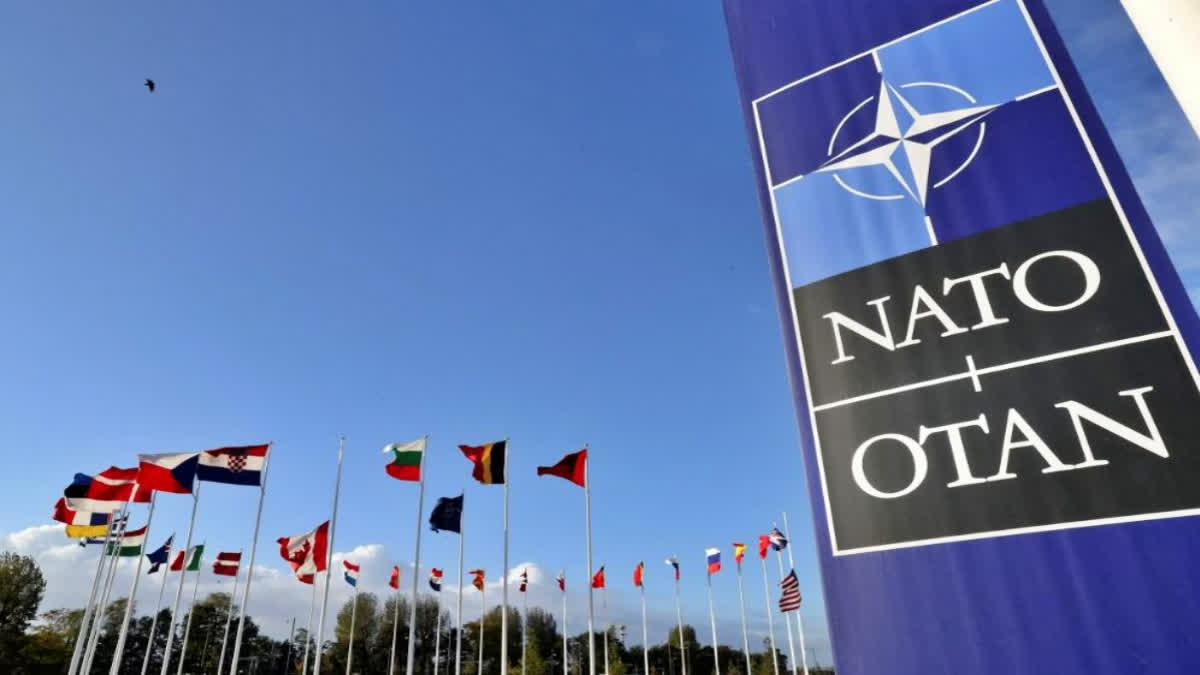New Delhi: The NATO summit in Vilnius, Lithuania, earlier this month has heralded a significant turning point for the military alliance, presenting both opportunities and challenges for the world at large, including India. As NATO strengthens its position amid the ongoing conflict between Russia and Ukraine and sets its sights on the Indo-Pacific, it raises questions about regional stability and the potential impact on India's extended neighbourhood.
The conflict sparked by Russia’s invasion of Ukraine in February 2022 has proven to be a boon of sorts for NATO in several ways. The alliance has capitalised on the situation, attracting new members and smoothing over internal differences as nations rally together in response to the crisis. The conflict has also opened up new theatres where NATO could potentially play a role, extending its influence and reach.
The NATO's expansion has been evident in its acceptance of traditionally neutral Finland and Turkey’s dropping of opposition to Sweden's candidacy. This expansion signals the alliance’s growing influence and appeal, even in regions that were previously hesitant to join. Turkey’s role as a mediator between Russia and Ukraine has also strengthened its standing within NATO, despite earlier critiques of its policy choices. Additionally, the conflict has prompted European nations like Germany to increase their defence budgets, fostering greater cooperation and easing tensions with the US.
As NATO looks beyond its traditional European focus, it has expressed concerns over China in its declaration, signaling a potential shift towards the Indo-Pacific. In the communique issued after the summit in Lithuania, China is mentioned as many as 16 times. “The People’s Republic of China’s stated ambitions and coercive policies challenge our interests, security and values,” the NATO communique stated.
“The PRC employs a broad range of political, economic, and military tools to increase its global footprint and project power, while remaining opaque about its strategy, intentions and military build-up. The PRC’s malicious hybrid and cyber operations and its confrontational rhetoric and disinformation target Allies and harm Alliance security.”
In fact, as early as April 2022, China had sounded alarm bells over NATO’s growing interest in the Indo-Pacific. “NATO had not been much involved in the Asia-Pacific affairs for quite a long time in the past,” Lu Xiang a research fellow at the Chinese Academy of Social Sciences, had written in an article in the Global Times, a daily tabloid newspaper published under the Chinese Communist Party that comments on international issues with Chinese ultra-nationalistic perspective. “But in recent years, it has been emphasising the so-called China threat with its tentacles reaching out to this region. The unprecedented increase in NATO’s interest in Asia-Pacific affairs means that NATO may be trying to establish itself as a global organisation, and indeed signs of this tendency have been noticed recently.”
What will draw Beijing’s ire is Japanese Prime Minister Kishida Fumio’s participation in the NATO summit this month ostensibly with the intention of providing long-term support to Ukraine in the face of Russia’s aggression. But reports suggest that Kishida’s participation in the summit was more about Japan expanding its partnership with NATO in the face of China’s military build-up in the Indo-Pacific. In fact, NATO is reportedly going to open a liaison office in Tokyo, a move that will take the military alliance beyond its traditional area of operation.
At the same time, Japan is also part of the Quad that also includes India, the US and Australia and which seeks to China’s influence in the Indo-Pacific. Given this, NATO’s interest in the Indo-Pacific could escalate tensions in the region, which is far from 31 member states of the alliance and falls within India's extended neighbourhood. India, which has been deepening its ties with NATO in recent years, needs to approach this development with caution and a keen awareness of its implications.
For India, the evolving dynamics of NATO’s involvement in the Indo-Pacific are cause for vigilance. While New Delhi has deepened ties with the alliance, it must carefully assess how NATO's increasing engagement in the region could impact stability and regional dynamics. India's strategic interests lie in maintaining peace and cooperation in its extended neighbourhood, and any escalation of tensions could have far-reaching consequences for the entire region.
While NATO has extended support to Ukraine, it has made it clear to Kyiv that it cannot get membership in the alliance as long as the war with Russia continues. In other words, NATO does not want to get into a war with Russia but will be happy as long as Kyiv continues to fight with Moscow.
The NATO’s expansion and increased ambitions after the conflict in Ukraine have altered the geopolitical landscape, drawing attention to its potential role in the Indo-Pacific. As India continues to foster its relations with NATO, it must navigate these developments with a cautious approach, ensuring that regional stability and cooperation are not compromised. The world needs multilateral solutions that prioritise peace and cooperation over proxy conflicts, fostering a more secure and stable global environment.
Also read: 'Russia's pullout from Black Sea Grain Initiative bodes ill for world food security'


